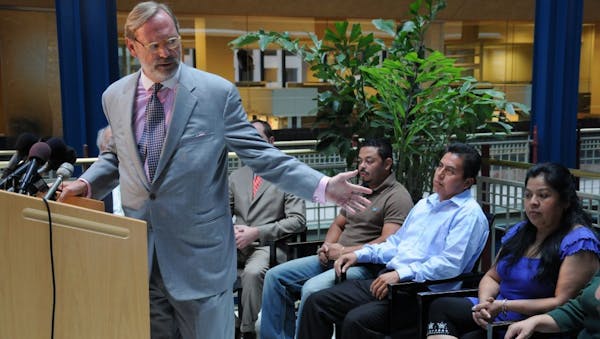In a luxury hotel room next to the Mall of America, the high-end prostitute had a list of clients, 40 condoms and a plastic bag containing $24,425 in cash.
Adrienne Chapa was arrested and spent a few days in jail before she went home to Las Vegas. The bag of money was here to stay.
Three days after Chapa's arrest in 2015, the Hennepin County attorney's office filed a lawsuit to keep the money through forfeiture. It took two years to resolve the legal cases, and $21,000 is finally getting distributed to the government.
Attorney General Jeff Sessions has called for a stepped-up use of forfeiture, the police power to confiscate money, cars, guns and other valuables linked to criminal behavior. It's a reversal from former President Barack Obama's Justice Department, which had retreated from the practice after reports of widespread abuse.
Minnesota legislators outlawed civil forfeiture in 2014, meaning that prosecutors could no longer seize property without a criminal conviction or an admission of guilt.
Still, law enforcement agencies exercised the power more than 7,000 times last year, netting $7.4 million in proceeds, the State Auditor reported in July.
Prostitution busts typically yield a few hundred dollars in cash or maybe an old car. But the Chapa case was hardly ordinary.
On the evening of May 5, 2015, a security guard at the Radisson Blu in Bloomington saw a woman in the hotel who looked like someone previously kicked out for trespassing. He watched her get into an elevator with two men, one of whom suspiciously did not use a key card to reach the room, according to the criminal complaint.
The security guard went to the fourth floor, where the woman was a guest, "and could hear a male and female making loud noises that could be heard several rooms away," the complaint said.
The guard caught up with the man from the elevator (identified only as a 60-year-old with the initials O.R.H.), who eventually admitted meeting the woman on an online prostitution site and paying her for sex. The guard called the Bloomington police. Chapa opened the door to an officer's knock and admitted that her erstwhile client had paid $5,000 to " 'date' her," the complaint said. She "begged" the officer to let her keep the cash, "as she stated she was hiding it from the IRS," the complaint said.
When a Bloomington detective later browsed the web, she found a website in which Chapa, under a pseudonym, advertised " 'packages' of three hours to several day long trips," the complaint said.
Prosecutors moved quickly in court to keep the cash from leaving the state. Nearly three months later, prosecutors drew up a gross misdemeanor prostitution charge. In an interview, her attorney, Avery Appelman, said seizing the cash was a "large motivating factor" for her prosecution and that police use forfeited property as a "slush fund."
The case trudged along for more than a year. In November, at home in Nevada, Chapa signed a paper entering a guilty plea and received a stay of adjudication, meaning the conviction will be erased if she stays out of trouble for two years.
It took another six months to resolve the fate of the money: $21,750 will be divided among the Bloomington police (40 percent), prosecutors (20 percent) and a state program to help victims of youth sex trafficking, called Safe Harbor (40 percent).
Chapa persuaded prosecutors that some of the cash was earned from her cooking business, said Chuck Laszewski, a spokesman for Hennepin County Attorney Mike Freeman. So she got to keep $3,250.
Chapa, 49, could not be reached for comment. Her customer was never criminally charged.
Contact James Eli Shiffer at james.shiffer@startribune.com • 612-673-4116

Want to share info with the Star Tribune? How to do it securely

'Safe recovery sites' would offer syringes, naloxone and more to people using drugs. The plan could be in peril.
New Minnesota GOP leaders seek peace with party's anti-establishment wing

Who is Republican Lisa Demuth, Minnesota's first House speaker of color?

